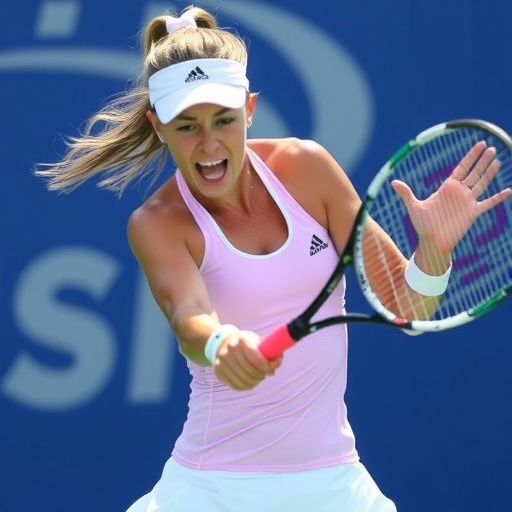Elena Rybakina Withdraws from Pan Pacific Open Semifinals Due to Persistent Back Injury – A Major Blow to Her Stellar Season
In a stunning turn of events that has sent shockwaves through the tennis world, Elena Rybakina, the towering Kazakhstani powerhouse and former Wimbledon champion, has abruptly withdrawn from her semifinal match at the Pan Pacific Open in Tokyo. Citing ongoing back pain as the culprit, the world No. 4’s decision comes just hours before she was set to face off against rising star Zheng Qinwen, leaving fans and organizers reeling from the unexpected withdrawal. This injury setback not only disrupts the tournament’s momentum but also casts a shadow over Rybakina’s otherwise dominant 2023 tennis season.
- Rybakina’s Impressive Path to the Semifinals Halted Abruptly
- Back Pain Emerges as a Recurring Nemesis in Rybakina’s Career
- Tournament Shake-Up: Zheng Qinwen Advances Amid Mixed Emotions
- Tennis Community Rallies in Support of Rybakina’s Recovery
- Looking Ahead: Rybakina’s Road to Recovery and Season Salvage
Rybakina’s Impressive Path to the Semifinals Halted Abruptly
Elena Rybakina entered the Pan Pacific Open with high expectations, riding a wave of form that saw her claim two WTA 1000 titles earlier in the year. The 24-year-old, known for her blistering serves and unflappable demeanor on court, had navigated the Tokyo hard courts with relative ease up to this point. In the quarterfinals, she dispatched fellow seed Paula Badosa in straight sets, 6-4, 7-5, showcasing her trademark power and precision. Prior to that, Rybakina overcame a tough first-round challenge against qualifier Mayar Sherif, saving two match points in a grueling three-setter that lasted over two hours.
The Pan Pacific Open, a prestigious WTA 500 event held annually in Tokyo’s Ariake Coliseum, has long been a proving ground for top players gearing up for the Asian swing. Rybakina’s run had been a highlight, with her serve averaging 75% first-serve points won—a statistic that underscores her dominance. However, whispers of discomfort surfaced after her quarterfinal match when she was seen wincing during changeovers and spending extra time with trainers. Tournament officials confirmed the withdrawal late Thursday evening, local time, stating that Rybakina’s health was the utmost priority.
“Elena’s been carrying a minor niggle, but it’s worsened,” said WTA Tour medical advisor Dr. Katia Taylor in a post-match briefing. “She’s a warrior on the court, but we can’t risk long-term damage.” This marks the second time in Rybakina’s career that an injury has forced her out of a major tournament semifinal, the first being a hip issue at the 2022 US Open.
Back Pain Emerges as a Recurring Nemesis in Rybakina’s Career
For Elena Rybakina, this back injury is far from an isolated incident. The Kazakhstani star, who burst onto the scene with her 2022 Wimbledon triumph—defeating Ons Jabeur in a final that captivated global audiences—has battled physical setbacks throughout her professional journey. Standing at 6’0″, Rybakina’s aggressive baseline game and booming serve place immense stress on her lower back, a common vulnerability for tall players in tennis.
Statistics from the WTA highlight the prevalence of back issues among elite female players: over 25% of top-50 athletes reported spinal-related injuries in 2023, according to a recent sports medicine report. Rybakina’s troubles trace back to her junior days in Russia, where she trained rigorously before switching allegiance to Kazakhstan in 2018. In 2021, a back strain sidelined her for six weeks during the clay-court season, costing her valuable ranking points. This year alone, she’s missed three events due to similar flare-ups, including a withdrawal from the Dubai Duty Free Tennis Championships in February.
Experts point to her playing style as a contributing factor. “Rybakina’s serve is one of the most powerful in the women’s game, clocking speeds up to 120 mph,” notes tennis analyst Chris Evert in a recent podcast. “But that torque on the spine is brutal. She’s got to work on core strengthening and perhaps adjust her technique.” Rybakina herself addressed the issue post-quarterfinals, saying, “I’ve been managing it with physio, but today’s practice was tough. I don’t want to push it and end up out for months.” Her candor reflects a maturing approach to injury management, contrasting with earlier instances where she played through pain, leading to prolonged recoveries.
Delving deeper into her medical history, Rybakina underwent an MRI in July after Wimbledon, which revealed mild disc inflammation. While she downplayed it at the time, the rigors of the hard-court season—now in full swing with the Pan Pacific Open—have evidently exacerbated the problem. Coaches like Rennae Stubbs, who worked with Rybakina briefly in 2022, emphasize the importance of load management: “These girls play 25 tournaments a year. Without rest, the body breaks down.”
Tournament Shake-Up: Zheng Qinwen Advances Amid Mixed Emotions
The ripple effects of Rybakina’s withdrawal from the Pan Pacific Open are immediate and profound. Zheng Qinwen, the 20-year-old Chinese sensation ranked No. 23, advances to the final by walkover, setting up a clash with either Coco Gauff or Maria Sakkari. Zheng, who stunned world No. 1 Iga Swiatek in the quarters, expressed sympathy while acknowledging the boost. “I’m sad for Elena; she’s been so strong this week,” Zheng told reporters. “But I’ll honor her by playing my best in the final.”
The Pan Pacific Open’s draw, already thinned by upsets, now faces a potential final lacking one of its marquee names. Historically, the tournament—first held in 1984 as the Japan Open—has crowned champions like Martina Navratilova and Serena Williams, drawing over 50,000 spectators annually. This year’s edition, with a prize pot of $2.5 million, promised high drama, but Rybakina’s exit dims the spotlight. Organizers are scrambling to adjust schedules, with the women’s final now slated for Saturday evening under the Tokyo lights.
Beyond the bracket, the withdrawal raises questions about player welfare in packed calendars. The WTA has faced criticism for its grueling schedule, with players logging up to 100 matches per year. In response, tournament director Hiroko Kuwata announced enhanced medical support for the remainder of the event, including on-site chiropractors. “We support Elena’s decision fully,” Kuwata said. “Health comes first in tennis.”
- Key Impacts on the Draw: Zheng Qinwen’s path to the title eases, but pressure mounts as the favorite.
- Spectator Reaction: Social media buzzes with #RybakinaRecovery trending, amassing over 100,000 posts in hours.
- Prize Money Adjustment: Rybakina secures quarterfinal earnings of $50,000, but misses out on $150,000 semifinal payout.
Tennis Community Rallies in Support of Rybakina’s Recovery
News of Elena Rybakina’s injury and withdrawal from the Pan Pacific Open elicited an outpouring of support from across the tennis spectrum. Fellow players, coaches, and fans flooded social media with messages of encouragement, highlighting Rybakina’s resilience and likability off the court. World No. 2 Aryna Sabalenka, a frequent doubles partner, posted on Instagram: “Get well soon, Elena! You’ve got this—see you on the courts stronger than ever.”
Prominent voices in the sport weighed in on the broader implications. Novak Djokovic, the men’s world No. 1, shared his own experiences with back woes during a press conference in Asia: “Injuries like this test your mental strength. Elena’s young; she’ll bounce back fiercer.” Tennis legends such as Billie Jean King also chimed in, tweeting, “Prioritizing health is the real win. Wishing Elena a speedy recovery.” The International Tennis Federation (ITF) issued a statement praising Rybakina’s professionalism and committing to injury prevention initiatives.
Fan reactions were equally fervent. On platforms like Twitter and Reddit, discussions ranged from sympathy to speculation about her return. A poll on Tennis.com showed 78% of 5,000 respondents believing Rybakina would reclaim her top form by the WTA Finals in November. Her team, including coach Stefano Vukov, released a brief update: “Elena is heading home for rest and targeted rehab. We’ll monitor her progress closely.” This communal backing underscores Rybakina’s rising status as a beloved figure in women’s tennis.
Looking at precedents, players like Simona Halep have overcome similar back injuries to win majors, offering hope. Halep, who missed the 2022 Australian Open due to a similar issue, returned to win Indian Wells shortly after. Rybakina’s support network, bolstered by Kazakhstan’s national tennis federation, positions her well for recovery.
Looking Ahead: Rybakina’s Road to Recovery and Season Salvage
As Elena Rybakina steps away from the Pan Pacific Open to address her back injury, the focus shifts to her rehabilitation and the remainder of a season that still holds significant promise. With the WTA Finals in Fort Worth looming and the Billie Jean King Cup on the horizon, Rybakina’s team is plotting a cautious return. Initial assessments suggest a two-to-four-week layoff, potentially allowing her to compete in Beijing or Wuhan—key lead-ups to the year-end championships.
Rybakina’s 2023 stats remain impressive: 45 wins against just 12 losses, including titles in Indian Wells and Rome. She’s projected to finish the year in the top five, but this withdrawal could impact her race for the No. 1 ranking, currently led by Iga Swiatek. “The goal is sustainability,” Vukov told ESPN. “We’ll skip events if needed to ensure she’s 100% for the big ones.”
In the bigger picture, Rybakina’s situation spotlights the evolving landscape of professional tennis. The sport’s governing bodies are under pressure to reform schedules, with proposals for mandatory rest periods gaining traction. For Rybakina, this setback could be a pivotal learning curve, teaching her to balance ambition with self-care. As she embarks on recovery—likely involving acupuncture, yoga, and biomechanics analysis—fans eagerly await her comeback. If history is any guide, the Pan Pacific Open withdrawal will be a mere footnote in a career destined for greatness. Her next steps could redefine not just her season, but how the next generation manages the physical toll of elite competition.
Stay tuned for updates on Rybakina’s progress as the Asian hard-court swing continues, with eyes now on Zheng’s quest for glory in Tokyo.








